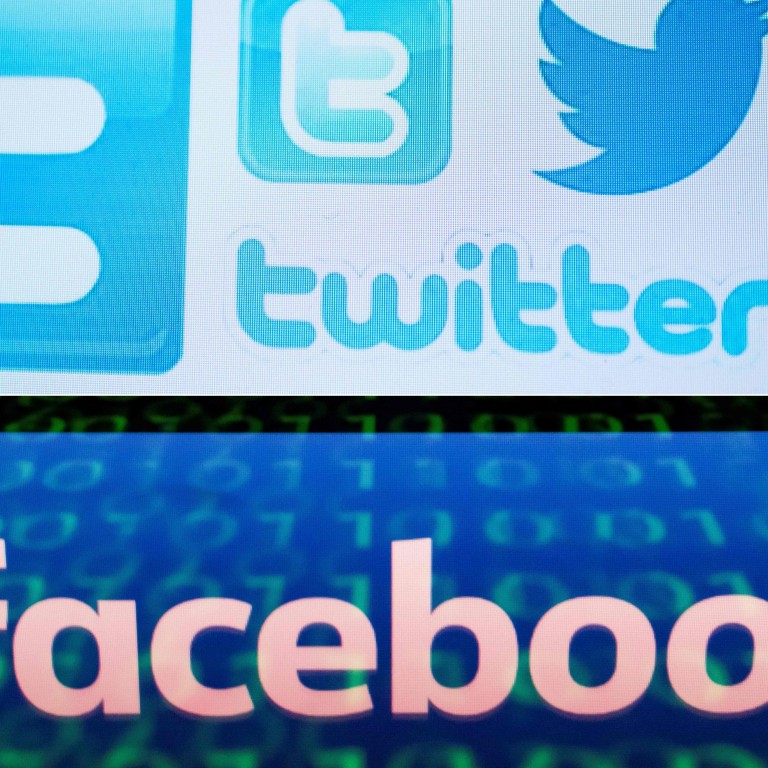
Twitter and Facebook suspend accounts for being part of China-backed campaign to disrupt Hong Kong protests
- The social platform Twitter says it has suspended 936 accounts originating within China; Facebook says it removed five accounts
- Twitter also announces it will no longer accept advertising from ‘state-controlled news media entities’
The social-media platform Twitter has suspended hundreds of accounts alleged to be part of a Chinese government-backed campaign to sow political discord in Hong Kong, and will no longer accept advertising from state-controlled media outlets, the company announced on Monday.
Additionally, Facebook removed seven pages, three groups and five accounts involved in what the company called “coordinated inauthentic behaviour as part of a small network that originated in China and focused on Hong Kong”.
In all, Twitter said that 936 accounts originating from within China have been suspended for a number of violations of the company’s “platform manipulation policies,” including spam, coordinated activity, fake accounts and ban evasion.
The social media activity of the suspended accounts, which posted in both English and Chinese, were part of efforts to undermine the “legitimacy and political positions of the protest movement on the ground”, the company said.
Twitter, Facebook and most other western social media platforms are blocked in mainland China. Most of the accounts identified by Twitter as “bad faith actors” circumvented the Great Firewall – as the country’s digital barrier is known – using virtual private networks (VPNs), though some were tracked to specific, unblocked IP addresses based in mainland China.
Though most of the accounts had fewer than 100 followers, 326 accounts had more than 10,000 followers and a handful had counts close to 300,000 followers.
“Covert, manipulative behaviours have no place on our service,” Twitter said. “They violate the fundamental principles on which our company is built.”
The company said “intensive investigations” had found “reliable evidence to support that this is a coordinated state-backed operation”.
1.7 million estimated at peaceful Hong Kong rally
When asked to clarify how its probe had ascertained a connection to the Chinese government, a spokeswoman for Twitter referred to the investigation’s findings that some of the accounts had been gaining access to Twitter without the use of VPNs.
Welcoming the move by Twitter, the Poynter Institute’s Baybars Orsek pointed to long-standing criticism of the company’s failure to respond effectively to misinformation on its platform.
“Hopefully, this would signal a change in their attitude to embrace more tools on fact-checking and verification,” said Orsek, who is director of the media research organisation’s international fact-checking network.
Facebook’s investigation, also announced on Monday, was prompted by a “tip” from Twitter, Facebook head of cybersecurity policy Nathaniel Gleicher said in a statement.
“We will continue monitoring and will take action if we find additional violations,” said Gleicher, adding that Facebook had shared the findings with other industry partners and law enforcement agencies.
Examples of the “coordinated inauthentic behaviour” identified by Facebook included posts that compared protesters to cockroaches, accused journalists of corruption and of colluding with “rioters”, and claimed that protesters, not police, had been responsible for the widely reported injury of a woman who may lose the use of one eye.
The young woman was injured when she was struck by a projectile during demonstrations in Hong Kong’s Tsim Sha Tsui neighbourhood this month. The incident prompted many who took part in subsequent protests to don eye patches in solidarity with the woman.
Though a Monday statement announcing the action did not single out Chinese state media, government-backed news agency Xinhua has recently utilised Twitter’s “promoted tweet” service to expand the reach of posts related to the ongoing unrest in Hong Kong.
In one such promoted tweet published over the weekend, Xinhua tweeted that “[people from] all walks of life in Hong Kong called for a brake to be put on the blatant violence and for order to be restored”.
Twitter said on Monday that affected accounts would be given a 30-day grace period to withdraw from the platform’s advertising products, after which the company would “stringently enforce these policies”.
‘Now is the time to meet demands’, protesters tell Hong Kong leaders
A determination of what accounts would be affected by the ban would be made based on factors including financial ownership, control of editorial content and direct or indirect exertion of political pressure, Twitter said.
Poynter’s Orsek said that the state media outlets targeted by the new restrictions could be expected to adapt their approach to circumvent the ban.
“Even though the indexes listed by Twitter in their announcement are credible, the state-sponsored media organisations around the world will be able to put this selection criterion under scrutiny as they develop more hybrid and hard-to-detect entities,” he said, adding that Twitter would face “inevitable questions” about whether the labelling system was applied consistently from country to country.
According to The Intercept, Twitter’s announcement of the advertising ban came a few hours after the online investigative magazine contacted the company for comment on its promotion of tweets by Global Times, a Chinese tabloid published under the auspices of People’s Daily, the mouthpiece of the Chinese Communist Party.
The Intercept found that Twitter had promoted 50 English-language tweets by Global Times between June and August, including several that sought to change public perceptions about the Chinese government’s measures in Xinjiang, where upwards of one million Uygurs and other ethnic minority groups are reported to have been forcibly detained and subject to political indoctrination.

